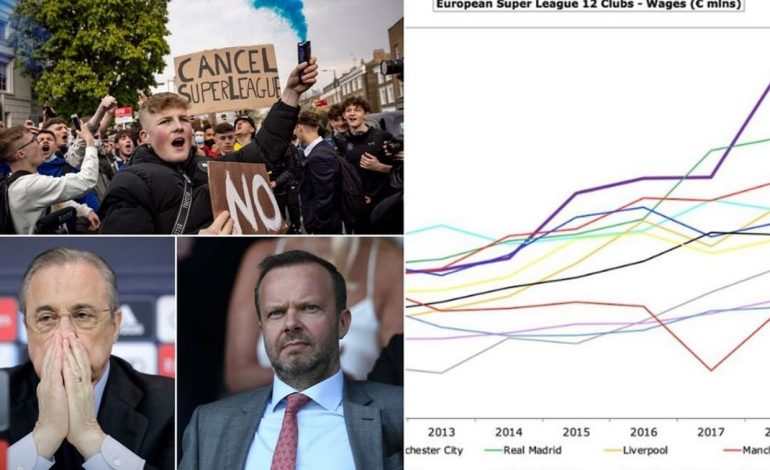
For so long, those who backed the European Super League told us that it was a necessary step.
While the age-old adage of the captain going down with their ship is a noble one, Florentino Perez’s performance on El Chiringuito spoke to a man desperately clawing to an idea that never really got off the ground, trying to convince himself that it could feasibly happen for the betterment of the game, rather than anyone else.
Indeed, the financial effects of the COVID-19 pandemic lead us here, we were told.
Although, clearly, the pandemic invariably will have an impact on the state of footballing finances, it is not the only issue top clubs have to deal with.
In fact, their own financial mismanagement is perhaps the biggest problem.
During an extensive deep dive into the problems at Barcelona, the excellent Swiss Ramble Twitter account collated the wage bills of the 12 clubs who attempted to break away from the rest of football.

As you can see above, it is Barcelona who led the way, having seen a rise between from €203m per year in 2011 to €443m in 2020. In 2019, their total of €503m was the highest of any one of the dirty dozen in the nine years accounted for.
Unsurprisingly, Real Madrid‘s figures are also mind-boggling. Breaking the €300m mark in 2017, they are now pushing €400m, double what they were paying in 2011.
Across the capital, Atletico Madrid might be seen as the heart-warming story of the less fashionable band of rebels challenging the more monied elite but their rise of €64m to €227m speaks to how much investment Diego Simeone has enjoyed over the years.
Juventus, meanwhile, were largely heralded as the masters of the transfer market when they started to dominate Serie A in the early 2010s. Signing stars like Andrea Pirlo, Paul Pogba and Dani Alves for free as they returned to the summit of Italian football, the Old Lady were celebrated for their ability to sniff out a good deal.

Still, the signing of Cristiano Ronaldo in 2018 changed everything. Granted, the great Portuguese forward has scored his fair share of goals but, frankly, Juventus look further off winning the Champions League with him in the side.
Bearing in mind their 2020 bill of €284m is almost €100m more than the €198m they posted in 2015 – when they made the final of Europe’s elite competition – that is a damaging return.
Elsewhere in Italy, the last decade has been a down period for the two Milan giants, until a return to former glories during the 2020/21 campaign. Inter haven’t broken the €200m mark since 2011 – coming close last time out at €198m – while AC’s total of €206m at the start of the recorded period was their highest by quite a big margin.
In a Premier League context, Manchester City (whose manager has stressed that the club cannot pay big for a striker) were paying a total of €193m in 2011 and, while domestic trophies have been forthcoming, the Champions League remains a pipe dream despite a rise to a €401m bill in 2020.
Liverpool‘s recruitment might rightly be celebrated as Jurgen Klopp ended a 30-year wait for a Premier League title and, as excellent a job as the German has done, their wage bill stood at €371m in 2020 compared to €143m in 2011.





